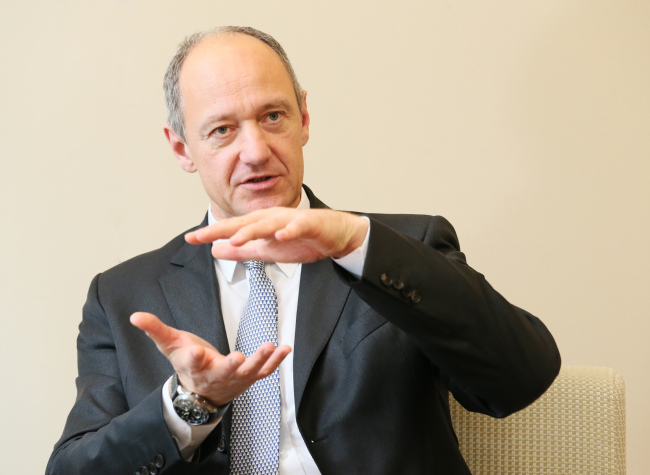Amid the prolonged global economic downturn, a global expert on sustainability notes that smart city development could be one of the key drivers for growth that countries should focus on.
“Actually, there are three drivers for economic growth. One is increasing population, and the second is industrial productivity,” Roland Busch, a member of the managing board of Siemens, told The Korea Herald in a recent interview.
“Actually, there are three drivers for economic growth. One is increasing population, and the second is industrial productivity,” Roland Busch, a member of the managing board of Siemens, told The Korea Herald in a recent interview.

Busch visited Seoul to deliver a keynote speech during the Construction Vision Forum, held in Seoul on Oct 29.
“The third driver is urbanization, another way of productivity, because the urban environment is the most effective and efficient way to provide infrastructure for people,” he said.
To utilize urbanization as a driver for growth, Busch advised cities to adopt smart and intelligent solutions in developing or improving their infrastructure.
A city’s infrastructure covers a variety of sectors, including waste management, water, sanitation, energy systems and telecommunications and transport systems.
“People are assets of a city. You have to make people work in a more productive and efficient urban environment,” he said.
As a global leading provider of smart city solutions, Siemens has carried out hundreds of projects for cities to make them have more productive and efficient infrastructure in different sectors ranging from transport to energy systems.
The managing board member of the German industrial giant took the firm’s driverless operation system for Paris’ metro as an example of successful smart city projects. The system increased the capacity of the metro line by up to 50 percent because the trains can run at shorter intervals.
He advised Seoul to invest more in upgrading the city’s infrastructure to compete with other cities in attracting talents.
“Seoul’s urbanization is growing as well. … The city’s system has to catch up. Otherwise, Seoul will fall behind,” he said.
Taking the importance of adopting smart solutions in urban development for granted, Seoul has worked with Siemens in evaluating where to prioritize investments for upgrading its infrastructure, using Siemens’ city performance tools.
One of biggest concerns of city planners in adopting smart city solutions is how to finance the projects.
“It is not too expensive to make the city smarter because if you do not move to increase the smartness or intelligence of a city or technology use of a city, it will fall behind other rivals. (In an era of urbanization), cities are competing with one another to attract best talents on an international scale. Seoul is no exception to this trend. … Not investing means falling back,” he said.
His insights on smart city development were shared with builders here who are seeking new growth engines.
HanmiGlobal chairman Kim Jong-hoon, who leads the Construction Vision Forum, said Korean builders can create a smart city development model, partnering with smart city solution providers.
By Seo Jee-yeon (jyseo@heraldcorp.com)



















